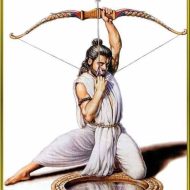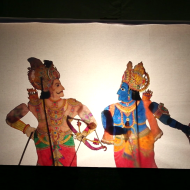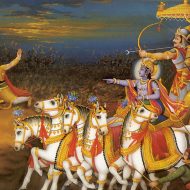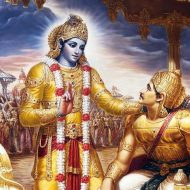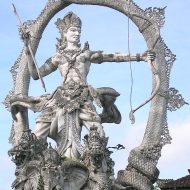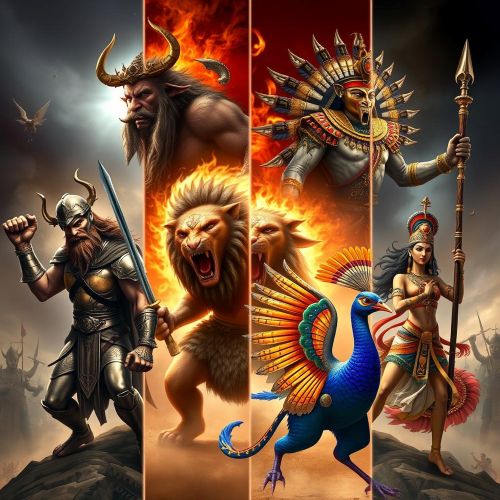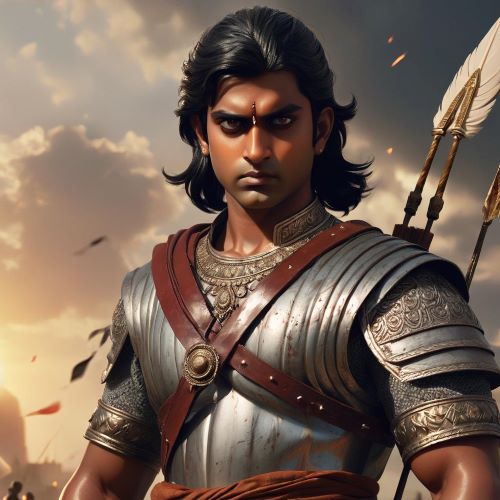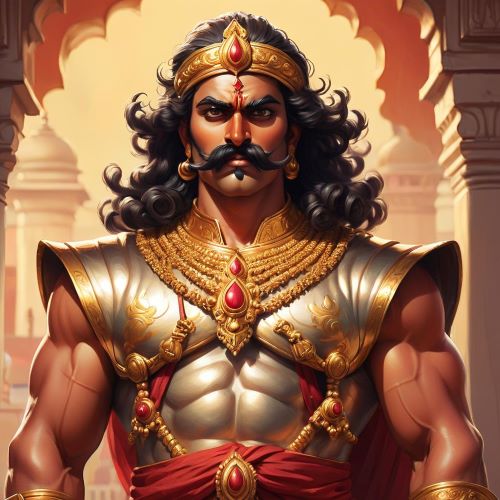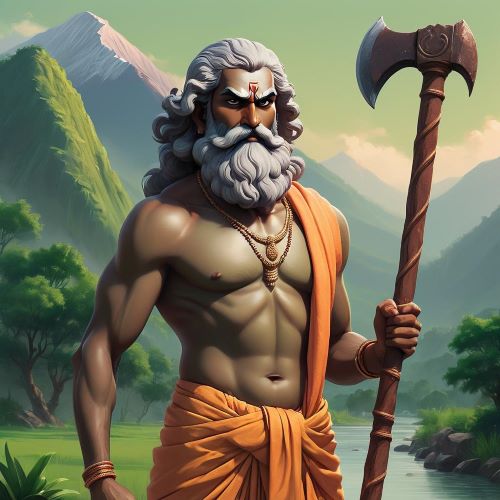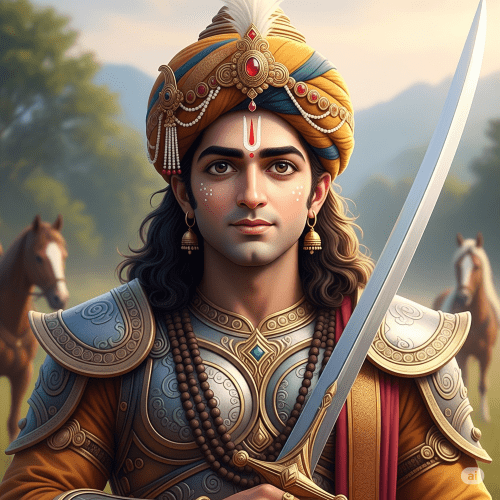Arjuna : The Greatest Warrior
Listen
At a glance
| Description | |
|---|---|
| Origin | Indian Mythology |
| Classification | Demigods |
| Family Members | Pandavas (Brothers), Kunti (Mother), Pandu (Father), Draupadi, Subhadra (Wives), Abhimanyu (Son) |
| Region | India, Indonesia, Cambodia, Vietnam |
| Associated With | Warfare, Archery |
Arjuna
Introduction
One of the Pandava brothers is Arjuna, who is known for his abilities to shoot with both his hands and for defeating Shiva with his magical weapons. He was born as Indra’s son. Before facing off against his family, he nervously waited for Krishna, the incarnate god who is the charioteer, to deliver a message of wisdom. These verses, which are referred to as the Bhagavadgita, are the culmination of the epic poem.
His name is derived from the words “shining” and “silver”, and it refers to the brightness of his being. He is regarded as the most popular champion of Hindu literature. He is also the third of the Pandavas, and the son of Indra, the storm god. He is flawed due to his stubborn nature and adherence to a code of honor that doesn’t consider the needs of others. He is also too proud of how he has treated his reputation.
Throughout the epic poem Mahabharata, which is about as far as it can go, there have been more adventures for Arjuna than any of his companions. This is because the work has a deep understanding of its characters and their backstories. In the Bhagavad Gita, which is also a part of the Mahabharata, he takes on the role of Krishna’s teacher-guide. When he learned that he had to participate in the Kurukshetra war, he initially refused to join the conflict. However, he eventually agreed to take part after receiving guidance from Krishna.
Physical Traits
He is a masterful archer and a formidable warrior, showcasing exceptional prowess in both combat and archery. His name itself implies a radiant and resplendent aura, reflecting his shining, silver, or bright appearance. Adorned with a celestial diadem bestowed upon him by Indra, the king of gods, he wields the mighty bow called Gandiva. Mounted on a pure white chariot drawn by milky white horses, he commands a striking presence on the battlefield.
His epithet, Gudakesha, alludes to his abundant hair or signifies his triumph over sleep, epitomizing his unwavering focus and dedication. Not only is he a skilled warrior, but he also possesses a deep understanding of the arts. His proficiency in music and dance stems from his tutelage under the god of love, Kamadeva, further enriching his multifaceted character.
Family
He was born to Pandu and Kunti, and he was given the energy of Indra, who was the king of the gods. When he was young, he was praised for his skills in archery. He was also known for his dedication and single-mindedness. He married Subhadra, who was the sister of Balarama and Krishna, and they continued to be friends. Lord Krishna would guide him throughout his life.
He traveled to places in the subcontinent and married Ulupi, a naga princess and the daughter of the king of Manipur, who was known as Chitrangada. Two warrior sons were then born to him through this marriage. One of these was called Abhimanyu, while the other was Bhabhruvahana.
Other names
He was known by different names or rather titles, such as Phaalgun, Keerti, Paartha, Savyashachee, Dhanajaya and so on. He ia also known as Guḍaskesha, Vijaya, Anagha, Bibhatsu, Jiṣhṇu, Kaunteya, and Brihannala.
Powers and Abilities
Armed with the formidable bow named Gandiva, Arjuna proved to be a formidable force, triumphing over his enemies with remarkable skill and precision. This powerful weapon was bestowed upon him by Varuna, the Vedic god of rain, through Agni, the god of fire, adding to his prowess on the battlefield. As a token of their benevolence, Agni also gifted him a divine golden chariot, which became an invaluable asset during his battles against his godfather Indra and later against his cousins, the Kauravas.
During the challenging period of exile when the Pandava brothers were compelled to wander the forests for twelve years, Arjuna had a fateful encounter with Lord Shiva, from whom he acquired the divine Pasupatha weapon. This divine weapon would prove to be instrumental in his future battles. Throughout his exile, Arjuna had the privilege of meeting Indra and other celestial gods in the heavens, where he received rigorous training and, in turn, assisted them by vanquishing malevolent asuras. These encounters further honed his skills and strengthened his bond with the celestial realm.
However, Arjuna’s true greatness was not solely defined by his martial abilities but also by his inner purity and unwavering loyalty to Lord Krishna. Such virtues earned him the profound fortune of receiving the divine knowledge of the Bhagavad-Gita. This sacred text served as a guiding light, enlightening him on the path of righteousness and duty, eventually influencing his choices and actions during the Mahabharata war.
Throughout the epic war, Arjuna played a pivotal role, demonstrating exceptional valor and courage as he confronted and vanquished formidable opponents, including the mighty warriors Bhishma, Karna, Dronacharya, and Jayadhrata. His unwavering loyalty to God and commitment to his brothers during their trials and tribulations made him a symbol of purity, integrity, and loyalty.
Modern Day Influence
Arjuna’s renowned legacy extends beyond the boundaries of his native land, resonating even in the Indonesian archipelago, where his figure has enjoyed long-standing popularity. Particularly celebrated in regions like Java, Bali, Madura, and Lombok, Arjuna has become an iconic presence in the local culture.
In Java and subsequently in Bali, Arjuna’s tales have been immortalized in various kakawin (Javanese epic poems) and wayang (shadow puppet) performances. Kakawin Arjunawiwāha, Kakawin Pārthayajña, and Kakawin Pārthāyana, also known as Kakawin Subhadrawiwāha, feature Arjuna as their central character, captivating audiences with his heroic adventures. The depiction of Arjuna can also be found in temple reliefs on Java, with notable examples being found at the Surawana temple.
The impact of Arjuna’s legendary status reaches far beyond the realm of mythology and cultural traditions. American astronomer Tom Gehrels honored this illustrious figure by naming a class of asteroids after him. These celestial bodies, known as “Arjuna asteroids,” possess earth-like orbits, featuring low inclination and low eccentricity.
In India, Arjuna’s eminence is commemorated through prestigious awards and advancements in modern technology. The Arjuna Award, presented annually, recognizes outstanding sportspeople across the nation for their remarkable talent and achievements, keeping Arjuna’s spirit of excellence alive in the realm of sports. Additionally, India’s Defense Research and Development Organization (DRDO) has paid homage to this revered hero by developing the Arjun, a third-generation main battle tank for the Indian Army. Symbolizing strength, innovation, and courage, the Arjun tank stands as a testament to Arjuna’s valor and continues to safeguard the nation’s security.
Related Images
Frequently Asked Questions
What is lorem Ipsum?
I am text block. Click edit button to change this text. Lorem ipsum dolor sit amet, consectetur adipiscing elit. Ut elit tellus, luctus nec ullamcorper mattis, pulvinar dapibus leo.
What is lorem Ipsum?
I am text block. Click edit button to change this text. Lorem ipsum dolor sit amet, consectetur adipiscing elit. Ut elit tellus, luctus nec ullamcorper mattis, pulvinar dapibus leo.
What is lorem Ipsum?
I am text block. Click edit button to change this text. Lorem ipsum dolor sit amet, consectetur adipiscing elit. Ut elit tellus, luctus nec ullamcorper mattis, pulvinar dapibus leo.
What is lorem Ipsum?
I am text block. Click edit button to change this text. Lorem ipsum dolor sit amet, consectetur adipiscing elit. Ut elit tellus, luctus nec ullamcorper mattis, pulvinar dapibus leo.
What is lorem Ipsum?
I am text block. Click edit button to change this text. Lorem ipsum dolor sit amet, consectetur adipiscing elit. Ut elit tellus, luctus nec ullamcorper mattis, pulvinar dapibus leo.

